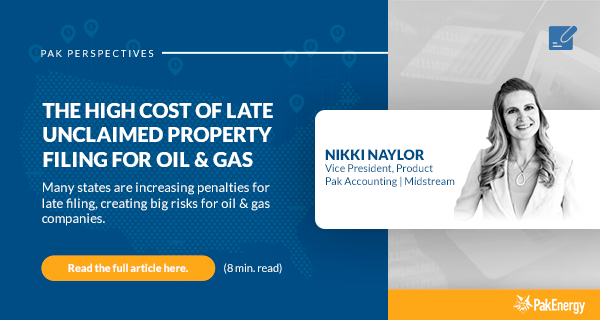
Oil & gas companies can suddenly find that they are outflanked by rapidly advancing unclaimed property rules and bounty-hunting auditors seeking to collect on draconian penalties for non-compliance. In a previous blog, I explained the different types of unclaimed property our industry must manage and the trends and legislative changes you should be prepared to navigate. Importantly, oil & gas companies should be aware of the complex ways they can be charged penalties, interest, and late fees, which is the topic of this post. Strangely though, these penalties are conspicuously absent alongside the filing deadlines and dormancy periods found on all state unclaimed property websites, leading to a general lack of awareness about the consequences of non-compliance (unless you are up to digging into complicated legal language found in unclaimed property laws).

Did you know Delaware's third-largest revenue source is now unclaimed property? In California, it's the fifth. But look at it from the state's point of view. State lawmakers across the country are reluctant to raise taxes further yet have increasing budgets to fund. Unclaimed property represents a low-hanging fruit, and it's a politically correct approach to reunite owners with their money. Of course, the catch is that 60% or more of escheated funds are never returned despite even the most wholehearted lost and found programs.
If simply keeping unclaimed property to fund programs isn't enough, many states are increasing the various penalties for late filing, all of which is creating risk for oil & gas companies.
Penalties for Non-Compliance are Substantial
Many states have penalties for late unclaimed property filings that seem reasonable compared to others even in cases of willfully refusing to relinquish funds or fraudulent filings. Take Alabama's straightforward penalty schedule for example: $100 per day for missing the deadline up to a maximum of $5,000, $500 per day for willfully refusing to file up to $25,000, and $1,000 per day up to $25,000 for fraudulent filings. This also showcases the recurring theme across all states to escalate the penalty based on whether the late filing is unintentional, intentional, or fraudulent.

In Texas, if you fail to file $1M of unclaimed property and did not participate in a VDA program, you could owe the state $237,200 in penalties after one (1) year of missing the filing deadline. That's because Texas instantly hits you with a 5% penalty the second you are late and another 5% 31 days later if payment is still late. Add 10% annual interest and a $100 per day late fee. For a state where nearly 65% of Fortune 500 companies are incorporated due to the perceived business-friendly laws and tax advantages, Delaware nonetheless dwarfs Texas by charging late filers 5% per month plus .5% interest each month. And because of the caps on each, the total cost of non-compliance is only $660,000 in Delaware on a $1M past due balance after 1 year.
Unbelievably, Delaware isn't even the worst-case scenario. With an annual 18% interest charge on the value of unclaimed property no matter the situation, and the $100 per day late filing fee seen across state laws, Colorado's highest penalty can reach 300% of property value. But it's not as easy as picking the right state with the most favorable escheat laws in which to incorporate. The Texas vs. New Jersey case of the 1960's led to the establishment of priority rules that make the location of the owner's last known address the state to file and remit. The state of where the holder's business is incorporated is the second priority rule.
Statute of Limitations and Third-Party Audits
So, is your team audit ready? Oil & gas companies should be prepared as more states actively search for unclaimed property to fill budget gaps. Factors that can trigger an audit include larger company size, failure to report all types of unclaimed property on prior filings (remember, it's more than just royalties held in suspense, AR credits, and AP balances too), and mergers and acquisitions. The latter is especially concerning given the current level of consolidation. States where audits are on the rise include Texas, Arkansas, New Mexico, Colorado, Montana, New York, Oklahoma, Louisiana, North Dakota, Wyoming, Pennsylvania, and (no surprise) Delaware.

A typical IRS audit only covers the last three (3) years and the best practice from a tax perspective is to retain data for seven (7) years. Unlike taxes though, an unclaimed property audit can reach back 15 years or more because there is no statute of limitations. Can you imagine being asked by an auditor to provide documentation from 2009 or even further back?
Many states now hire third-party auditors who work on a contingency basis (if they don't find unclaimed property, they don't get paid), resulting in reward-hungry bounty hunters who are more than happy to find a reason to audit you and dig through your corporate financial history. And because most companies look at their records from an IRS/statute of limitations lens, the records are long gone. In this case, auditors estimate what unclaimed property was never filed. And these estimations (Delaware, we’re looking at you again) are perhaps the biggest unclaimed property liability oil & gas companies have.
Voluntary Disclosure Agreement Programs
While the penalties for failing to meet state unclaimed property laws may seem draconian, state voluntary disclosure agreement (VDA) programs are a less expensive path to compliance. A VDA allows a company to disclose past due unclaimed property once in exchange for the state waiving many of the penalties and interest with a reduced lookback period. In many cases, this can reduce the total cost to a fraction while allowing the VDA participant to perform a self-audit. Of course, like anything involving unclaimed property, there are pitfalls.
States are increasingly sending VDA notices to encourage companies to enroll. However, these letters are often printed on inconspicuous slips of paper that can easily be mistaken for typical correspondence from the state. Once overlooked though, a full audit can be triggered by companies who miss the VDA deadline. Trying to enroll after the fact can be viewed by the state as suspicious and triggers an audit anyway.
Good news for California unclaimed property filers - the state has finally launched its Voluntary Compliance Program (VCP) and is known to waive penalties for those who come forward in good faith.
The Only Energy Specific Escheat Solution
As states increasingly seek to fund budgets with unclaimed property and the practice of hiring contingency-based auditors continues, oil & gas companies must up their escheat game to stay compliant amidst evolving laws, dormancy periods, and penalties. And the landscape of penalties presents a minefield of extreme consequences where the cost of non-compliance varies widely. Some states, like Alabama, are a downright bargain, and others, like Delaware, are actively acquiring unclaimed property to fuel state spending.
Let The Pak be your partner in navigating unclaimed property risk. We've built the only oil & gas specific escheat solution that automates and accelerates unclaimed property management, from tracking owners and sending due diligence letters to applying the latest dormancy triggers and waiting periods for every state and US territory.
Discover the 10 states with the highest fees for missing unclaimed property filings, plus a state-by-state listing of fees in this exclusive download:
The Complete List of Unclaimed Property Penalties »
With nearly 20 years of oil and gas industry experience, Nikki Naylor has extensive expertise in oil & gas accounting processes, regulations, and best practices. She currently serves as Product Manager at PakEnergy, where she works closely with customers to drive new features and enhancements to the Pak Accounting software platform. Before joining PakEnergy, Nikki served as Senior Revenue Distribution Manager for NGL Crude Logistics and Division Order Analyst at Barr Energy. Nikki has been involved in escheatment for the past 12 years and she is also a long-term member of UPPO. Nikki holds a Bachelor of Science in Biology from the University of Central Oklahoma.

